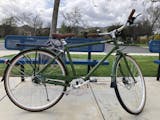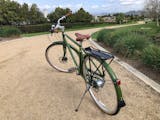Commuter Bike Buying Guide
Commuter bikes are sought after for their versatility as well as their ability to get you and your cargo where you need to go. Whether you are riding to work, running errands, or pedaling to the local watering hole, we love commuter bikes for discovering those simple pleasures buried in your daily grind. Common traits found on most commuter bikes include flat handlebars, a comfortable saddle, a wide gearing range, and all-terrain puncture resistant tires. Combined, the components of a well-designed commuter bike deliver a comfortable riding position all the while ensuring pedaling to your destination is nearly effortless.
The term "commuter bike" tends to encompass a rather broad scope in the bike world. While you can truly commute on any bike, some bikes will undoubtedly be better suited for commuting than others. For us, a well-designed commuter bike is always ready to get you and your cargo wherever it is you're going, both safely and cleanly, regardless of the weather, terrain, or distance. Our focus here will be on highlighting five important things to consider when buying a commuter bike. This doesn't mean you can't have a bit of fun along the way, so we'll also share some suggestions on how to ensure that weekday commuter bike can double as a weekend around-towner.
Given the broad scope of the "commuter bike" category, it’s no wonder you'll find an equally broad price range. We hope our guidance below will help you find the right balance between what you need, what you want, and what you want to spend. Keep in mind, a lesser priced bike may lack the necessary features for longer or mixed terrain commutes, while a much higher priced bike may leave you worrying that your precious new commuter won’t be there waiting for you at the end of the day. In your search, you will encounter a variety of frame materials, gearing ranges and braking systems, but not to worry, we've got you covered. That said, we won't focus exclusively on features as we wouldn’t want your bike to fail six months into your newfound city-shredding commuter life, so durability lands high on our priority list as well. With that, let’s dive in and learn a bit about what makes a great commuter bike.
Frame Type & Frame Material
Frame type comes down to one of two options, each with their distinct advantages: diamond frame and step-through frames. The primary difference between a diamond frame bike and a step-through frame bike is the design of the frame, with diamond frame bikes having a high-cross-bar, creating a diamond shape between the top tube, down tube, seat tube, and chainstays. This design offers optimal structural integrity and is the conventional bicycle design.
On the other hand, step-through frame bikes, have a lower top tube or cross-bar, or no cross-bar at all. This design provides easier access for the rider to mount and dismount the bike, particularly for individuals wearing dresses or skirts, or those who have difficulty lifting their legs over the high-cross-bar of a diamond frame bike. Step-through bikes are ideal for riding with a child so you’re not forced to throw your leg over the back of the bike when mounting.
While diamond frame bikes are often lighter and provide better structural integrity due to the efficient use of materials, step-through frame bikes are more convenient for certain riders, including those with limited mobility or balance. Ultimately, the choice between the two frame designs comes down to personal preference and the specific needs of the rider. Both frame types are entirely suitable for commuting.
Moving on to frame material, which is an oft debated topic. With so many options, it’s not surprising there are a similarly wide variety of opinions. While we aren’t here to dissect opinions, we will say that you really can’t go wrong with any of the frame materials referenced below. They will each have their pros and cons but all are suitable for commuter bicycles.
- Steel & Chromoly Steel – It’s commonly said that “steel is real” and it’s understandable why steel maintains an almost cult-like following amongst cycling enthusiasts. Favored for its strength, durability and ease of repair, steel also has a natural ability to flex which provides subtle shock absorption on unforgiving city streets. Note that suspension bridges are made of steel for this exact reason – their ability to flex. Unfortunately, steel also has an unshakeable, yet unwarranted reputation for being heavy. Many of today’s commuter bikes, our Roebling & Lorimer models being great examples, sport a premium steel blend such as chromoly, which renders the weight difference between it, and the industry’s stalwart frame material, aluminum alloy, negligible.
A workhorse of the industry, chromoly is a light, strong steel. When it is butted and shaped to take off excess weight, it provides a lighter frame that will last through years of hard use. It retains the responsiveness of steel, offering good flex while maintaining its form, without the excess weight
- Aluminum – Aluminum is the go-to option for budget to mid-range bikes, providing a combination of low weight, stiffness, and affordability that’s hard to beat. While the exact properties of an aluminum alloy frame will vary from one bike to the next, typically, it’s relatively lightweight with a higher level of stiffness, at a fraction of the price of carbon fiber. Despite its weight benefits, aluminum stiffness can result in a harsh ride quality. Aluminum can also fatigue over time and is more challenging to repair than steel.
- Carbon - Carbon fiber is a highly adaptable material that can be shaped and fine-tuned to precise requirements. This fine tuning often strikes a much-appreciated balance between stiffness, comfort, and weight. However, carbon is not without its downfalls as carbon framed bikes are often significantly more expensive and more susceptible to crash damage than other frame materials.
Easy Riding
Very few of us desire to arrive at our destination dripping in sweat so ensuring an easy ride is high on our list of considerations. Topping this list for ensuring your bike is easy to ride is gearing which is essential on a commuter bike, because it affects the bike's ease of use, efficiency, and overall performance while riding in different terrains and conditions. Commuter bikes are designed for practicality, comfort, and reliability, and the appropriate gearing system can significantly enhance these features.
A suitable gearing system on a commuter bike can provide riders with more control, especially while riding on steep hills or windy terrain. It can also improve the bike's overall speed, making it easier to reach destinations quickly and efficiently. Additionally, the right gearing can reduce stress and strain on the rider's knees and legs, reducing the risk of injuries or strains. The ideal gearing system for a commuter bike depends on your preferences and the terrain you will most often be riding on. Commuter bikes usually have a range of gears to choose from, allowing riders to adjust the resistance or speed of their bike to suit their riding conditions.
Bikes with a wider gearing range that can accommodate attachments like a cargo rack and fenders, will serve you best. Alternatively, if you're simply looking to ride recreationally around the neighborhood or to the supermarket, we’d suggest a bike with fewer gears that’s a bit more simplistic in nature. Ultimately, the goal is to make sure you’re not buying more bike than you’ll need for your use case.
One more note, the more often and longer you ride, you'll also benefit from a comfortable saddle for ensuring your bottom never tires before your legs do.
Safe Riding
When we think bike safety, safe stopping with road-gripping tires immediately come to mind. That said, we must not forget add-ons to ensure you can see and be seen (think bike lights) and hear and be heard (think bike bells).
While some bikes come with a coaster brake (pedal brake), we have reservations with this system for a commuter bike as this creates a single point of failure should your chain become compromised. Instead, we favor rim brakes which are lightweight and provide ample front and rear stopping power. They’re also economical, much easier to repair, and compatible with a wider range of bikes.
That being said, disc brakes have become increasingly popular in recent years due their improved stopping power, especially in wet conditions, as well as their durability and reliability. Ultimately the choice between rim brakes and disc brakes depends on the rider’s preferences, riding style, and the specific needs of the bike.
One quick note on disc brakes – there are two different types, hydraulic and manual. Many lower priced bikes will use poor quality mechanical disc brakes to check the box that they’re using disc brakes, but you’ll likely be disappointed in their performance. The more powerful option would be hydraulic disc brakes which use fluid to amplify the force applied to the caliper. They’re noted for being more reliable, requiring less maintenance than manual disc brakes.
For tires, we aren’t talking super wide cruiser bike style tires, but we do suggest a tire width that remains wide enough to be forgiving on city streets with a low resistance, yet grippy tread for all-weather riding. If you’re riding on a well-manicured and well-maintained street, slimmer tires may be suitable. Note that such flawless streets do not exist in Brooklyn.
And if your rides take place after dark, and we say they should, don’t forget lights for being seen. Also not to be forgotten is a bell to make sure you can be heard. Be sure to find one that will sound as sweet as it looks. And please, do not forget a helmet to protect that noggin of yours.
For more on bike safety, see our safe riding guide which dives a bit deeper into the key areas for staying safe on the road.
Make Your Commuter Bike Work for You
Now for the fun part. One of the best parts of a new commuter bike is making it your own, AKA accessorizing! A common trait you’ll see with commuter bikes is their ability to be customized and upgraded. This can include accessories like fenders, bells, lights, saddle bags, luggage racks, wicker or metal baskets, and more.
While the primary focus of this piece is the bike itself, it is critical to ensure your bike can easily accommodate all the add-ons you’ll need for your daily ride. We would be reluctant to purchase any bike that doesn’t offer amply options for adding on any components or accessories that you may need.
Durability
Last, but certainly not least, is taking precautions to ensure your new commuter bike lasts. Given that many commuter bikes are ridden on unforgiving city streets, we tend to favor steel frames for their natural absorption ability. In addition to the frame, ensure your other components such as cranksets, handlebars, seat posts, spokes and rims are all made of a weather resistant material, such as aluminum alloy. While this saves weight, it has the added benefit of reducing the likelihood your bike becomes a rusty eyesore halfway through your first season with it. The same can be said with your chain, be sure it has some sort of heavy-duty rust-prohibitive treatment. Our flagship commuter bike, the Roebling, leverages a rust prohibitive EPT coating which delivers many years of rust-free riding, regardless of what Mother Nature has to say about it.
The last, but arguably most important thing - as with all bikes, we are huge advocates of having your bike professionally assembled. This gives you three distinct advantages:
- Properly adjusted bikes are safer (consider the importance of well-functioning brakes)
- Professionally assembled & dialed-in bikes have longer lifespans (consider the importance of proper lubrication and well-adjusted gearing)
- You’ll have a relationship with a local bike shop who’ll quickly and easily get you back riding, should something ever go wrong
Tooting our own horn, every one of our bikes includes professional assembly through our pioneering Buy & Ride Program. This affords you all the benefits noted above and of course also aligns you with a local shop should you ever need assistance with your ride or have questions as you embark on your riding journey.
Thanks for following along, now get out and ride.
Craving more bike buying knowledge? We’ve got you covered there as well. Click HERE to get our “Definitive Guide to Buying a Bike” where we share six must know things to consider before hitting that add-to-cart button.

We build bikes for vivid lives—for taking adventures, reconnecting with old friends, discovering new neighborhoods and exploring hidden gems. Inspired by the streets of Brooklyn, our bikes are built for style, comfort, and durability. Made with top quality parts, crafted with care, and sold at an affordable price, your bike is yours for life. We scrutinize every component for maximum sustainability and performance, and every millimeter of the frame for ultimate comfort and style. We take pride in our process, in our products, and in the people who sell them.







